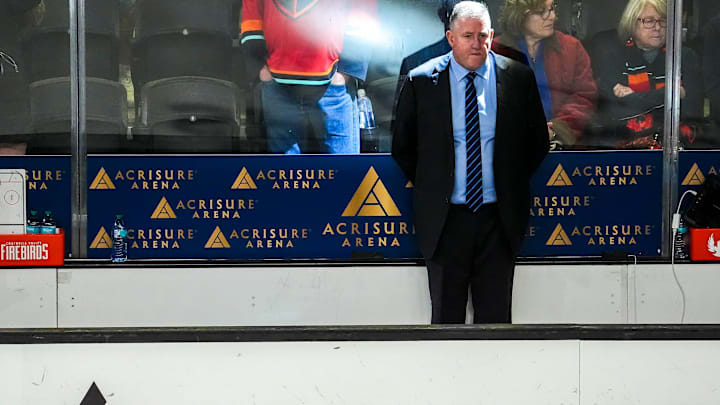As the final buzzer echoed through Abbotsford's arena, signaling the Coachella Valley Firebirds' 2–0 loss to the Abbotsford Canucks in Game 4 of the Pacific Division Semifinals, the weight of the moment settled in. For the first time in three seasons, the Firebirds' playoff journey ended before the Calder Cup Finals. While the previous two seasons saw them fall in the finals, this year's early exit was marked by a significant offensive drought.
Firebirds build on strong regular season
The 2024–25 season began with a sense of optimism for the Coachella Valley Firebirds, especially with the arrival of new head coach Derek Laxdal, who stepped in after Dan Bylsma’s promotion to the Seattle Kraken. Laxdal brought a fresh perspective and an emphasis on player development, aiming to build on the team’s previous successes. Under his leadership, the Firebirds played with grit and determination, finishing the regular season with a strong 37–25–5–5 record, totaling 84 points, and securing the 4th seed in the competitive Pacific Division.
Throughout the season, the Firebirds demonstrated their depth, with different players stepping up at key moments. The team had a balanced mix of experienced veterans and exciting young prospects, providing Laxdal with various options in terms of lineup combinations. Players like Mitchell Stephens, Jani Nyman, and Jagger Firkus made their mark as offensive threats, while the defense and goaltending remained solid. It wasn’t just about individual star power; the Firebirds proved they could rely on the collective effort of the team to succeed.
This season wasn’t without challenges, but it showed how resilient the Firebirds could be. Whether dealing with injuries or adjustments to new systems, they remained a tough and competitive force in the AHL. The team’s ability to consistently perform and adapt to the changing landscape of the league was a testament to their growth, setting the stage for their playoff push.
Playoff Heartbreak for the Firebirds
The Coachella Valley Firebirds entered the playoffs with high hopes, but their run was cut short by a 3–1 series loss to the Abbotsford Canucks in the second round. The series began with promise, as the Firebirds secured a thrilling 5–4 overtime victory in Game 2. However, that would be their only win. Over the next two games, the team struggled offensively, managing just one goal and ultimately being shut out 2–0 in the decisive Game 4.
The offensive struggles were stark, with the Firebirds' usually potent offense—averaging over three goals per game during the regular season—failing to find its rhythm in the playoffs. Key players like Jani Nyman and Jagger Firkus were held scoreless throughout the series, leaving the team without its usual offensive spark. In contrast, Mitchell Stephens stepped up, leading the team with three goals in the two games he played.
While the offense faltered, goaltender Nikke Kokko delivered a stellar performance in net. Starting all six playoff games, Kokko posted a 1.95 goals-against average and a .921 save percentage, giving his team a fighting chance despite the scoring woes. His resilience and skill in goal were bright spots in an otherwise frustrating postseason for the Firebirds.
The Firebirds' next chapter
The Firebirds’ early playoff exit is a tough pill to swallow, but it’s important to keep perspective. Despite the setback, the team has shown resilience and a commitment to growth, highlighted by three consecutive playoff appearances. The absence of top scorer Jani Nyman, who is likely to join the Seattle Kraken full-time next season, opens the door for a new leader to emerge in the AHL. In the ever-evolving world of the AHL, adaptability is key—whether it’s an aging NHL journeyman looking for a final opportunity, a young prospect aiming to make a name for himself, or an NHL-caliber player like Phillip Grubauer sent down to rediscover his game.
While this season’s early exit is a disappointment, it’s a testament to the Firebirds' consistency and ability to perform under pressure. Now, with Jason Botterill stepping in as the new Kraken general manager, we could see a shift in how the Firebirds are managed, with potential players from their successful system being promoted to help strengthen the Kraken roster. The Firebirds’ future remains bright, and with fresh leadership in the front office, there’s optimism that the team will continue to develop and contribute to Seattle’s success.
